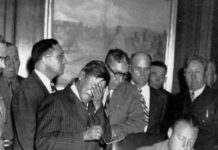In the West, Adam Smith is considered to be the father of economics. He is revered both by Western academics and in Western popular culture and government, particularly within the citadel of the international right-wing, Washington, D.C.
It’s all the more ironic, that Adam Smith, “got most of his best ideas and best lines from medieval Islam”, specifically from Sharia law, as noted by David Graeber, an anthropologist who has taught at Princeton and the London School of Economics.
For example, around the year 1,100, Islamic thinker, al-Ghazali, “highlighted the importance of the division of labour” using “the example of a needle factory to illustrate his point”. Seven centuries later, Adam Smith used the same example, a needle factory, to illustrate the same idea, division of labour, but without citing al-Ghazali.
Ibrahim M. Oweiss, an Associate Professor Emeritus in the Department of Economics at Georgetown, writes that another of Smith’s Islamic sources, and perhaps the most important, may have been Ibn Khaldun.
Oweiss notes that Khaldun’s “significant contributions to economics should place him ahead of Smith in the history of economic thought as Smith’s great works were published some three hundred and seventy years after Ibn Khaldun’s death.
Not only did Ibn Khaldun plant the germinating seeds of classical economics, whether in production, supply, or cost, but he also pioneered in consumption, demand, and utility, the cornerstones of modern economic theory.
It was Ibn Khaldun, not Adam Smith, who first presented the contribution of labour in terms of building up the wealth of a nation.
It was also Ibn Khaldun who made the case for a free economy and for freedom of choice.
Khaldun’s “theory of taxation has affected modern economic thought and even economic policies in the United States and elsewhere.”
It was not until “centuries later, that his ideas were developed by the Mercantilists, the commercial capitalists of the seventeenth century-Sir William Petty (A.D. 1623-1687), Adam Smith (A.D. 1723-1790), David Ricardo (A.D. 1772-1823), Thomas R. Malthus (A.D. 1766-1834), Karl Marx (A.D. 1818-1883), and John Maynard Keynes (A.D. 1883-1946), to name only a few – and finally by contemporary economic theorists.”
Professor Joseph Alois Schumpeter, an Austrian-born American economist and political scientist who served as Finance Minister of Austria in 1919, writes, cited by Oweiss, that Adam Smith was in fact “a mere collector of previous economic thoughts.
He eloquently presented these ideas in detail in an excellent new form and style, but nevertheless, by comparison, Ibn Khaldun was far more original than Adam Smith, in spite of the fact that the former had also restructured and built upon foundations laid down before him, such as Aristotle’s analysis of money and Tahir Ibn al-Husayn’s treatment of government’s role.
Still, it was Ibn Khaldun who founded the original ideas in numerous areas of economic thought.”
One of the reasons Westerners often prefer to attribute these ideas to Smith and other people of European descent rather than to Sharia law is to assist with the previously mentioned propaganda campaigns that are intended to dehumanize victims of the West.
Oweiss notes that “ever since the Crusades, which lasted from the eleventh to the thirteenth centuries, most Western philosophers attempted to discount the impact of Muslim scholars through a multiplicity of approaches, which included using Muslim ideas without mentioning the name of a Muslim author.
The protracted war waged by the Crusaders to capture the Holy Land from the Muslims created a strong antagonistic feeling, well embedded in the Western mind, from which Western scholars were not immune and which lasted for centuries, probably until modern times.”
Another example of this dynamic is the founders of the US taking ideas about government and other areas from Native philosophers, then leading the extermination of the Native nations while using propaganda to suppresses their humanity, a project that unfortunately also continues today.
Though Smith does not cite specific sources for the ideas he gets from Sharia, he does openly praise Muslim economic systems generally, writing in his History of Astronomy that “the empire of the Caliphs seems to have been the first state under which the world enjoyed that degree of tranquillity which the cultivation of the sciences requires.
It was under the protection of those generous and magnificent princes, that the ancient philosophy and astronomy of the Greeks were restored and established in the East; that tranquillity, which their mild, just and religious government diffused over their vast empire, revived the curiosity of mankind, to inquire into the connecting principles of nature.”
One noted European historian who breaks from the trend of refusing to praise specific Muslim scholars, Arnold J. Toynbee writes of Ibn Khaldun that “in his chosen field of intellectual activity, (Khaldun) appears to have been inspired by no predecessors and yet, in the Prolegomena to his Universal History he has conceived and formulated a philosophy of history which is undoubtedly the greatest work of its kind that has yet been created by any mind in any time or place.”
Oweiss concludes that because of Khaldun’s “unprecedented contributions to the overall field of economics, he, not Adam Smith, should be considered the father of economics.”
But as long as Western fundamentalists are allowed to maintain their disproportionate monopoly on violent force, which allows them to hunt down and murder dissident writers and thinkers worldwide while using Nazi-like propaganda to justify their international armed robbery, it’s probably best that we don’t hold our breath.
Robert Barsocchini is an internationally published author who focuses on force dynamics, national and global, and also writes professionally for the film industry.
Follow the Neptune Prime channel on WhatsApp:
Do you have breaking news, interview request, opinion, suggestion, or want your event covered? Email us at neptuneprime2233@gmail.com





